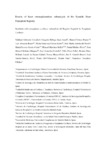Results of heart retransplantation: subanalysis of the Spanish Heart Transplant Registry

Ver/
Use este enlace para citar
http://hdl.handle.net/2183/32057Coleccións
- INIBIC-ICATC - Artigos [174]
Metadatos
Mostrar o rexistro completo do ítemTítulo
Results of heart retransplantation: subanalysis of the Spanish Heart Transplant RegistryTítulo(s) alternativo(s)
Resultados del retrasplante cardiaco: subanálisis del Registro Español de Trasplante CardiacoAutor(es)
Data
2021-07-10Cita bibliográfica
Salterain-González N, Rábago Juan-Aracil G, Gómez-Bueno M, Almenar-Bonet L, Crespo-Leiro MG, Arizón Del Prado JM, García-Cosío MD, Martínez-Sellés M, Mirabet-Pérez S, Sobrino-Márquez JM, González-Costello J, Pérez-Villa F, Díaz-Molina B, de la Fuente-Galán L, Blasco-Peiró T, Garrido-Bravo IP, García-Guereta Silva L, Gil-Villanueva N, Gran F, González-Vilchez F. Results of heart retransplantation: subanalysis of the Spanish Heart Transplant Registry. Rev Esp Cardiol (Engl Ed). 2022 Jan;75(1):60-66. English, Spanish.
Resumo
[Abstract] Introduction and objectives: Heart retransplantation (ReHT) is controversial in the current era. The aim of this study was to describe and analyze the results of ReHT in Spain.
Methods: We performed a retrospective cohort analysis from the Spanish Heart Transplant Registry from 1984 to 2018. Data were collected on donors, recipients, surgical procedure characteristics, immunosuppression, and survival. The main outcome was posttransplant all-cause mortality or need for ReHT. We studied differences in survival according to indication for ReHT, the time interval between transplants and era of ReHT.
Results: A total of 7592 heart transplants (HT) and 173 (2.3%) ReHT were studied (median age, 52.0 and 55.0 years, respectively). Cardiac allograft vasculopathy was the most frequent indication for ReHT (42.2%) and 59 patients (80.8%) received ReHT >5 years after the initial transplant. Acute rejection and primary graft failure decreased as indications over the study period. Renal dysfunction, hypertension, need for mechanical ventilation or intra-aortic balloon pump and longer cold ischemia time were more frequent in ReHT. Median follow-up for ReHT was 5.8 years. ReHT had worse survival than HT (weighted HR, 1.43; 95%CI, 1.17-1.44; P<.001). The indication of acute rejection (HR, 2.49; 95%CI, 1.45-4.27; P<.001) was related to the worst outcome. ReHT beyond 5 years after initial HT portended similar results as primary HT (weighted HR, 1.14; 95%CI, 0.86-1.50; P<.001).
Conclusions: ReHT was associated with higher mortality than HT, especially when indicated for acute rejection. ReHT beyond 5 years had a similar prognosis to primary HT. [Resumen] Introducción y objetivos. El retrasplante cardiaco (ReTC) representa un tema controvertido actualmente. Nuestro objetivo es describir y analizar los resultados del ReTC en España.
Métodos. Análisis retrospectivo del Registro Español de Trasplante Cardiaco de 1984 a 2018. Se recogieron datos sobre donante, receptor, cirugía, inmunosupresión y supervivencia. La mortalidad por todas las causas o la necesidad de ReTC postrasplante fueron el objetivo principal. Se estudiaron diferencias en supervivencia según indicación, tiempo entre trasplantes y época del ReTC.
Resultados. Se estudiaron en total 7.592 trasplantes cardiacos (TxC) y 173 (2,3%) ReTC (mediana de edad, 52,0 y 55,0 años respectivamente). La enfermedad vascular del injerto fue la indicación de ReTC más frecuente (42,2%) y 59 pacientes (80,8%) recibieron el ReTC más de 5 años después del trasplante inicial. El rechazo agudo y el fallo primario del injerto disminuyeron como indicaciones durante el periodo estudiado. La insuficiencia renal, la hipertensión, la necesidad de ventilación mecánica o balón intraaórtico y la mayor duración de la isquemia fría fueron más frecuentes en el ReTC. La mediana de seguimiento del ReTC fue 5,8 años. El ReTC tuvo peor supervivencia que el TxC (HR ponderado = 1,43; IC95%, 1,17-1,44; p < 0,001). El rechazo agudo (HR = 2,49; IC95%, 1,45-4,27; p < 0,001) se relacionó con el peor resultado. El ReTC más allá de 5 años del trasplante inicial presagia resultados similares a los del TxC primario (HR ponderado = 1,14; IC95%, 0,86-1,50; p < 0,001).
Conclusiones. El ReTC se asoció con mayor mortalidad que el TxC, especialmente por rechazo agudo. El pronóstico del ReTC realizado más de 5 años después es similar al del TxC primario.
Palabras chave
Heart transplant
Heart retransplantation
Survival
Trasplante cardiaco
Retrasplante cardiaco
Supervivencia
Heart retransplantation
Survival
Trasplante cardiaco
Retrasplante cardiaco
Supervivencia
Versión do editor
ISSN
1885-5857





